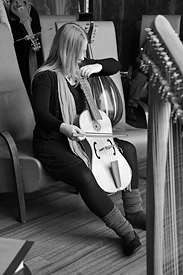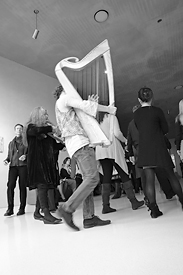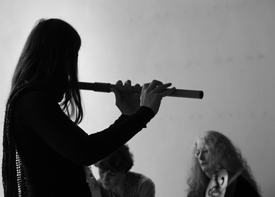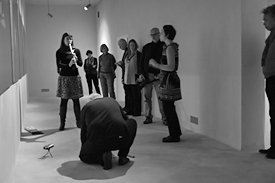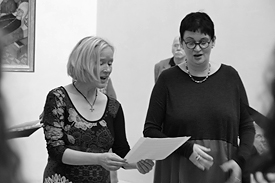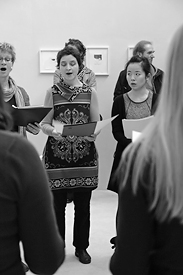11/12 Sound Workshop
4 November 2012, 12 to 4 p.m.
»Arnold von Harff's journey«
Featuring Vladimir Ivanoff and Maria Jonas & Ars Choralis Coeln. The 6th Klangwerkstatt (Sound Workshop) KOLUMBA will deal with the topic of travel: Knight Arnold von Harff, Lord of Nierhoven, Patrimonial Chamberlain in Geldern was born in 1471, the second son of Adam von Harff and his consort Rikarda von Hoemen at Harff Castle in Kaster near Bedburg. In 1496, he had embarked from Cologne on a long pilgrimage, which brought him to the great pilgrim destinations of Christendom, i.e. to Rome, Jerusalem, and Santiago de Compostela, via France, Italy, the Balkans, Palestine, Syria, the Ottoman Empire and the Iberian Peninsula. He covered several thousand kilometers using various modes of transportation and in all, from the time he left Cologne on 7 November 1496 till the time he returned on 10 October 1498 - he had been gone a full two years.
Nearly every western music instrument is Middle Eastern in origin and, according to recent research, medieval singing techniques were apparently also very similar to Middle Eastern practices. In addition to essential elements of musical presentations during the Middle Ages in Europe, such as the art of embellishment, the heterophony of variations and modal improvisation, most music genres in the west were inspired by the Middle East as well: here above all, it was the Gregorian chant and the stanzaic song with refrain. We would like to trace these roots that are so important for our musical practice, and then implement them by playing music together. To do so, we have been able to get Dr. Vladimir Ivanoff to come, renowned director of the Sarband Ensemble. Together with him, we will encounter an understanding of music that surpasses our classical-western notions.
The Orient - or more precisely, the Middle East and its various cultures - is considered as being the historical cradle of human culture and civilization in general and - since the early European Middle Ages - as the essential catalyst for the most important western cultural features. Above all, the Golden Age of Al-Andalus, the Arab-ruled Spanish peninsula, gave Europe many of its cultural and civilizatory roots.
The long cultural heyday of the Middle East also produced the classical Arabian musical culture, which in the meantime can look back to an unbroken and independent tradition of more than 1000 years. With its complex maqam modal system, its completely monophonic nature and its very own musical instruments and ways of presentation, it is fundamentally different from classical music in the west, even though it had exerted a decisive influence on it in the European Middle Ages.
In the 6th Sound Workshop KOLUMBA, together with Vladimir Ivanoff, we will focus on this medieval repertory, in which the history of the pilgrimage made by Arnold von Harff is related to us through Eastern techniques of playing music. For this, we will be using medieval sources from Cologne, Florence, Cortona, and from the Galego-Portuguese linguistic area.
This Sound Workshop will deal with precisely such diversity - a diversity, which was new to the pilgrim from the Rhineland back then, and which must have impressed him and certainly sometimes appeared strange to him.
»Arnold von Harff's journey«
Featuring Vladimir Ivanoff and Maria Jonas & Ars Choralis Coeln. The 6th Klangwerkstatt (Sound Workshop) KOLUMBA will deal with the topic of travel: Knight Arnold von Harff, Lord of Nierhoven, Patrimonial Chamberlain in Geldern was born in 1471, the second son of Adam von Harff and his consort Rikarda von Hoemen at Harff Castle in Kaster near Bedburg. In 1496, he had embarked from Cologne on a long pilgrimage, which brought him to the great pilgrim destinations of Christendom, i.e. to Rome, Jerusalem, and Santiago de Compostela, via France, Italy, the Balkans, Palestine, Syria, the Ottoman Empire and the Iberian Peninsula. He covered several thousand kilometers using various modes of transportation and in all, from the time he left Cologne on 7 November 1496 till the time he returned on 10 October 1498 - he had been gone a full two years.
Nearly every western music instrument is Middle Eastern in origin and, according to recent research, medieval singing techniques were apparently also very similar to Middle Eastern practices. In addition to essential elements of musical presentations during the Middle Ages in Europe, such as the art of embellishment, the heterophony of variations and modal improvisation, most music genres in the west were inspired by the Middle East as well: here above all, it was the Gregorian chant and the stanzaic song with refrain. We would like to trace these roots that are so important for our musical practice, and then implement them by playing music together. To do so, we have been able to get Dr. Vladimir Ivanoff to come, renowned director of the Sarband Ensemble. Together with him, we will encounter an understanding of music that surpasses our classical-western notions.
The Orient - or more precisely, the Middle East and its various cultures - is considered as being the historical cradle of human culture and civilization in general and - since the early European Middle Ages - as the essential catalyst for the most important western cultural features. Above all, the Golden Age of Al-Andalus, the Arab-ruled Spanish peninsula, gave Europe many of its cultural and civilizatory roots.
The long cultural heyday of the Middle East also produced the classical Arabian musical culture, which in the meantime can look back to an unbroken and independent tradition of more than 1000 years. With its complex maqam modal system, its completely monophonic nature and its very own musical instruments and ways of presentation, it is fundamentally different from classical music in the west, even though it had exerted a decisive influence on it in the European Middle Ages.
In the 6th Sound Workshop KOLUMBA, together with Vladimir Ivanoff, we will focus on this medieval repertory, in which the history of the pilgrimage made by Arnold von Harff is related to us through Eastern techniques of playing music. For this, we will be using medieval sources from Cologne, Florence, Cortona, and from the Galego-Portuguese linguistic area.
This Sound Workshop will deal with precisely such diversity - a diversity, which was new to the pilgrim from the Rhineland back then, and which must have impressed him and certainly sometimes appeared strange to him.
